 |
|
| plants text index | photo index |
| mangroves > Rhizophora in general |
| Bakau
minyak Rhizophora apiculata Family Rhizophoraceae updated Oct 2016 Where seen? This mangrove tree is among the most commonly seen Rhizophora in our mangroves. According to Ng, it is gregarious on deep soft mud of estuaries flooded by high tides. According to Geisen it 'avoids' firmer substrates mixed with sand, and prefers tidal waterways with strong freshwater input. It can be dominant, forming 90% of the vegetation at a site. According to Hsuan Keng, they are common in mangroves and recorded for Changi, Jurong, Seletar and Bajau. It was formerly known as R. conjugata. It is also known as 'Bakau putih' (white Bakau) and 'Bakau tandok' (horned Bakau). Features: Tree 20-30m tall. Bark dark grey and chequered. Conspicuous arching stilt roots that can extend 5m up the stem. Often also with lots of aerial roots emerging from the branches so that the tree appears to have a skirt of roots under the leaves Leaves eye-shaped (8-15cm long), glossy green and stiff, with tiny evenly distributed black spots on the underside. Stipule is usually (but not always) red. Flowers (1-2cm) in pairs on very short stalks so they appear to be stuck directly onto the branch. Calyx globular hard thick, brown on the outside yellow inside. Petals yellow to white, flat membranous and hairless, falling off soon after blossoming. The fruit looks like a brown, upside down pear (about 2cm) and is crowned by short persistent sepals. The cylindrical hypocotyl can be up to 38cm long, somewhat smooth, green ripening purple. Human uses: According to Giesen, the wood is heavy and hard and requires careful seasoning to prevent splitting but thereafter works and finishes well. It is used for foundations in piling, beams and the outriggers of dugout canoes, as well as furniture and interiors of houses. Branched stilt roots as used for making anchors. It is also used for firewood and it is the preferred mangrove tree for making charcoal. It is sometimes planted to protect bunds and dykes. It is also used in mangrove rehabilitation and plantation forestry. |
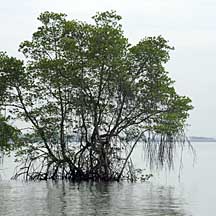 Chek Jawa, Oct 09 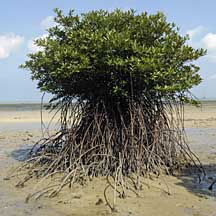 Pulau Semakau, May 07 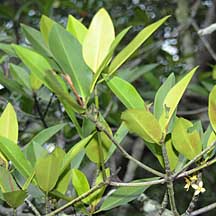 Sungei Buloh Wetland Reserve, Aug 09 |
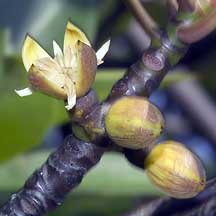 Flower on very short stalks. Pulau Semakau, May 07 |
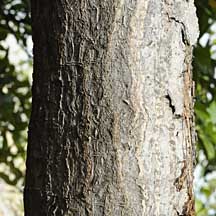 Pulau Semakau, Mar 09 |
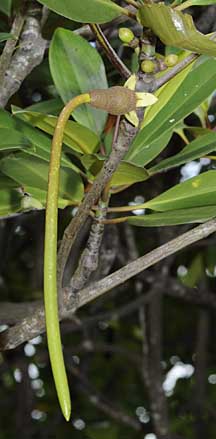 Usually a bent hypocotyl. Pulau Semakau, Mar 09 |
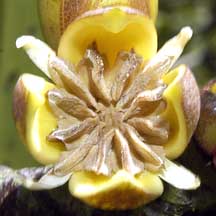 Chek Jawa, Jun 03 |
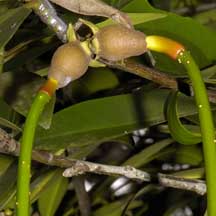 Fruit on very short stalk, almost stuck to the branch. Sungei Buloh Wetland Reserve, Mar 04 |
| Bakau minyak on Singapore shores |
| Photos Banyak minyak for free download from wildsingapore flickr |
| Distribution in Singapore on this wildsingapore flickr map |
|
Links
Other references
|
|
|